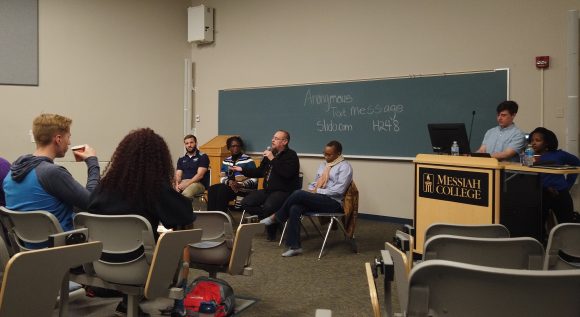Matt Dekonty
Student Writer
Yesterday evening, the Multicultural Council held a panel of Messiah faculty discussing the importance of black history, as well as its relation to the official month, and how students should go about learning and applying their historical knowledge.
“If you don’t know where you’ve been, you don’t have a clear idea of where you can go,” said Todd Allen, professor of communication, when asked about the importance of learning history. He also discussed how past experiences with his own family members caused him to rethink how he taught, as well as what he was teaching, and related those changes to the importance of understanding one’s own history, and how it fits into the greater story of humanity.
“These conversations are important, they need to happen, and there are opportunities for them to happen at Messiah,” said Jake Miaczinsky, a member of the multicultural council and co-host of the event. “It’s our duty as Christians to be relational.”
Relationships were consistently emphasized by the panel members as one of the most critical elements of improving the conversation. “It’s about intentionality and relationship,” said Pepita Uwineza, the treasurer of the multicultural council and co-host of the event. She encouraged students who are interested in furthering these relationships to join or meet with the MCC. “Try and make friends and join the multicultural council,” she said. “People are very open there.”
While the night was one of optimism and civility, there was still an acknowledgment of how deeply rooted these issues are on a societal level, including the issue of black history typically being mostly channeled into February – the shortest month of the year, as panelist Charlene Lane pointed out. Lane, professor of social work, said, “History did not begin when we came to the Americas and when we got to the Caribbean. We have a rich history, and we can look back at that.”
On the issue of ‘history beginning when we came to the Americas’, some audience members questioned Messiah’s own history curriculum, and whether or not it places too much emphasis on just traditionally white history and leaves most black history to the well-known stories such as those of Martin Luther King Jr. and Rosa Parks.
“I had a teacher who chose in an English class, to incorporate black voices throughout his entire class. The more black history is taught from black voices, the stronger it is,” said Bryan Brunk, head coach of the wrestling department.
“Now that you know, what are you going to do with the information?” Lane said. The question is meant to be one that should inspire further action beyond just simple conversation or readings. “Simply knowing is not enough.”

